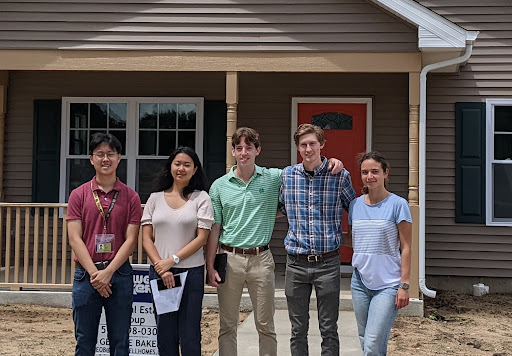
A group of interns working at the Notre Dame Center for Civic Innovation spent the summer of 2022 focused on housing affordability in our local community. The team collaborated with Habitat for Humanity in St. Joseph County, IN to develop strategies to reduce the financial barrier to first time homeownership.
Kenny Abraham, (Michigan Technological University, Mechanical Engineering), Yeji Kwon (University of Notre Dame, Architecture & Real Estate), Jeremy Hochschild, (University of Notre Dame, Finance & Real Estate), Moana de Souza Martins, (Bethel University Engineering Management), and Derick Shi, (Penn High School) worked to address the rising appraisal values of homes that are making homes unaffordable for income restricted home buyers. CCI was mentored by Jason Arnold of the Fitzgerald Institute of Real Estate (FIRE) to come up with cost saving designs for Habitat builds. The CCI interns were tasked with determining alternatives to design that would decrease the appraisal value while maintaining the functionality of the home (known as the appraisal gap). The diverse background of the team, spanning across STEM and finance, aided them in designing creative solutions from construction and financial perspectives to address the housing appraisal gap. “Working at NDCCI was an amazing foundational experience for me; the team and the community was extremely supportive. Getting to collaborate with community partners to better understand South Bend’s need for quality affordable housing was both educational and invaluable for my future career in real estate,” said Jeremy Hochschild.
The interns researched housing development solutions from engineering, architectural, and financial perspectives and developed four potential solutions (incremental housing, monolithic slab foundation, duplex housing, community land trust). These designs were meant to bridge the gap between affordable housing current appraisals and what families below the AMI (Area Median Income) level can afford. While researching the designs they garnered feedback from community members through an online survey, created by the team, to gauge homeowners interests on the potential solutions to reduce the appraisal gap. Developing innovative ways to reduce the appraisal value of homes without decreasing the quality will be critical in maximizing the impact affordable housing projects can have in communities.
The team presented a feasibility analysis of the solutions in the form of a white paper and a presentation at the Habitat for Humanity Board Meeting.